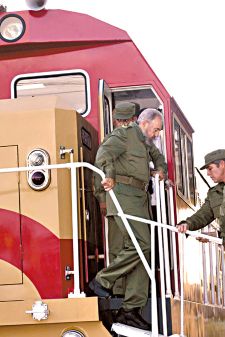| Tools: Save | Print | E-mail | Most Read |
| 12 Chinese Locomotives Arrive in Havana |
| Adjust font size: |
"It's very comfortable," Cuban leader Fidel Castro said on January 14 when he stepped off one of 12 diesel locomotives that arrived in Havana by ship from China. "We have just received 12 locomotives from China," Castro said in an interview published in the Sunday edition of the Juventud Rebelde newspaper. "They are simply the best our country has received. They are the most modern, most efficient and of best value."
China signed a locomotive export contract with Cuba during President Hu Jintao's visit there in November 2004. Since then, several engineers have visited the Caribbean island country to inspect its railway lines. Armed with their research results, they modified the design of the Dongfeng 7G locomotive, to enable it to run at a maximum speed of 120 kilometers per hour with 2,500 horsepower. Plus freight, the locomotives cost over US$15 million. Cuba obtained them on credit with preferential interest rates and repayment schedules. Previously, Cuba used second-hand trains from France and Canada as well as some abandoned by Mexico. The arrival of the 12 Chinese locomotives, the first to be exported from Asia, will significantly improve the Latin American country's rail transport system. The deal marked the beginning of Cuba's railway sector's recovery after a 15-year economic crisis, Castro said. Delivered along with the locomotives were 80 Yutong coaches. Last September, Zhengzhou Yutong Coach Manufacturing Co Ltd signed a contract worth US$100 million with Cuba to export a total of 630 ZK6120HA coaches. There are currently about 200 China-made buses shuttling between Cuban cities. The Cuban government has set traffic improvement as this year's key priority, which creates tremendous business opportunities for Chinese companies. Ranked as Cuba's fourth largest trading partner in 2004, China jumped to second spot in 2005 after Venezuela. The value of Chinese exports to Cuba grew 95 percent in the first 10 months of 2005 to over US$500 million, while imports rose 17 percent to US$200 million, according to Yang Shidi, China's commercial counsel in Havana. (China.org.cn by Shao Da, January 16, 2006) |
| Tools: Save | Print | E-mail | Most Read |
 |
| Related Stories |
| Product Directory China Search |
Country Search Hot Buys |
